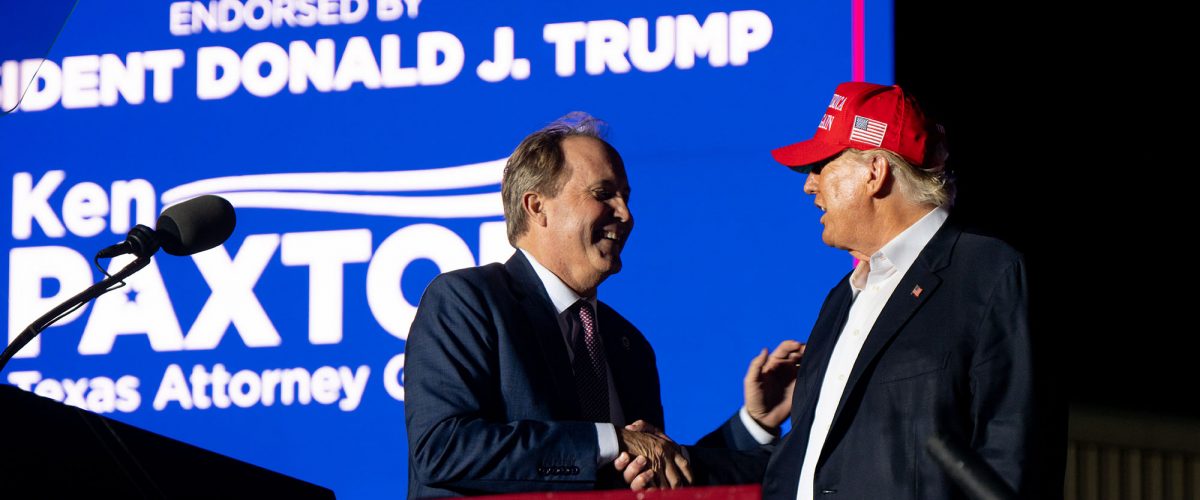A state district judge has blocked Texas Attorney General Ken Paxton’s attempt to obtain records from a faith-based migrant services shelter in El Paso.
Paxton filed suit against Annunciation House, a historic Catholic nonprofit, when the shelter failed to provide client records within the one-day deadline it was given. The ministry in turn sought a temporary injunction to block the state’s administrative subpoena. Paxton has accused the ministry of harboring illegal immigrants.
On March 11, Judge Francisco Dominguez issued an order halting Paxton’s legal action and raising questions about the state’s targeting of faith-based migrant shelters.
“The attorney general’s efforts to run roughshod over Annunciation House, without regard to due process or fair play, call into question the true motivation for the attorney general’s attempt to prevent Annunciation House from providing the humanitarian and social services that it provides,” Dominguez said in his order. “There is a real and credible concern that the attempt to prevent Annunciation House from conducting business in Texas was predetermined.”
“There is a real and credible concern that the attempt to prevent Annunciation House from conducting business in Texas was predetermined.”
The case against Annunciation House began Feb. 7 when representatives from Paxton’s office arrived at the facility demanding client records be turned over within 24 hours. Paxton deemed the shelter to be non-compliant when its lawyer asked for 30 days to produce the documents.
Paxton responded by filing suit to shut down the shelter by revoking its state license. He also issued a statement accusing Annunciation House and other migrant ministries of committing “astonishing horrors,” such as human smuggling, and blaming them for “worsening illegal immigration.”

Francisco Dominguez
Dominguez directed the case to be litigated using the Texas Rules of Civil Procedure, a set of guidelines designed to ensure fair play between parties, according to his order.
“If the work that Annunciation House conducts is illegal, so too is the work of our local hospitals, schools and food banks,” shelter director Ruben Garcia warned on Facebook recently.
But Annunciation House isn’t the only setback Texas has faced as part of Operation Lone Star, Gov. Greg Abbott’s controversial border security program he says will reduce border crossings as he blames the Biden administration for surging immigration trends.
Earlier this month, a U.S. judge in Texas dismissed the state’s lawsuit against a federal parole program that grants legal entry to as many as 360,000 Cubans, Haitians, Nicaraguans and Venezuelans on an annual basis. According to the White House, the system was designed to ease pressure on the southwestern border by providing legal channels of immigration.
In response, Paxton sued the federal government in January 2023 claiming Texas and 19 other states involved in the litigation suffer financial harm because parolees are entitled to public education, health care and other services.
But District Judge Drew Tipton didn’t see it that way in his March 8 ruling. “Plaintiffs, therefore, are unable to demonstrate that they have been injured by the program, and as a result, they lack standing to bring these claims.”
The Haitian Bridge Alliance praised the ruling: “This decision represents a positive development in the ongoing efforts to support and protect vulnerable communities that are experiencing chronic insecurity, natural disasters, and for those seeking to reunite with family members in the United States.”
Meanwhile, a Texas law that would allow state law enforcement officers to arrest migrants — typically a U.S. Customs and Border Patrol responsibility — could go into effect after weeks of wrangling in the federal courts.
Meanwhile, a Texas law that would allow state law enforcement officers to arrest migrants could go into effect March 13 after weeks of wrangling in the federal courts.
On March 1, U.S. District Judge David Ezra in Austin barred the measure from taking effect, arguing immigration issues should remain strictly in the federal domain. The U.S. Fifth Circuit Court of Appeals overruled Ezra the following day. After an appeal by the U.S. Justice Department, the U.S. Supreme Court issued a temporary stay until March 18 as it considers the case.
Signed into law in December, SB-4 makes illegal border crossings state misdemeanors punishable by six months in jail for first offenders. Repeat offenders can be charged with felonies and face up to 20 years in prison.
“The law also authorizes — and in some cases requires — Texas judges, who are not trained in immigration law and have no proper authority to enforce it, to order individuals deported under certain circumstances,” the American Civil Liberties Union warned.
The law is particularly unsafe to people of color, even those who are U.S. citizens or otherwise residing in the country legally, the ACLU said. “SB-4 places our communities and those traveling in Texas at higher risk of racial profiling and over-policing. In that respect, we are all at risk, but our brown and Black communities are at greater risk of enforcement of this cruel and unlawful law.”
The measure will have a range of negative effects, said Domingo Garcia, national president of the League of United Latin American Citizens.
“SB-4 makes our communities less safe because migrants will be afraid to report crimes to the police,” he said. “When crime victims and witnesses do not report, only the criminals thrive. Also, SB-4 will hurt our economy because many migrants will not venture out as much. Businesses will suffer because migrants will likely move from Texas to safer, more welcoming states.”
Related articles:
Texas attorney general sets off religious liberty alarms by attacking a Catholic charity in El Paso
Once again, faith and humanitarian groups decry Texas’ latest approach to ‘border security’


